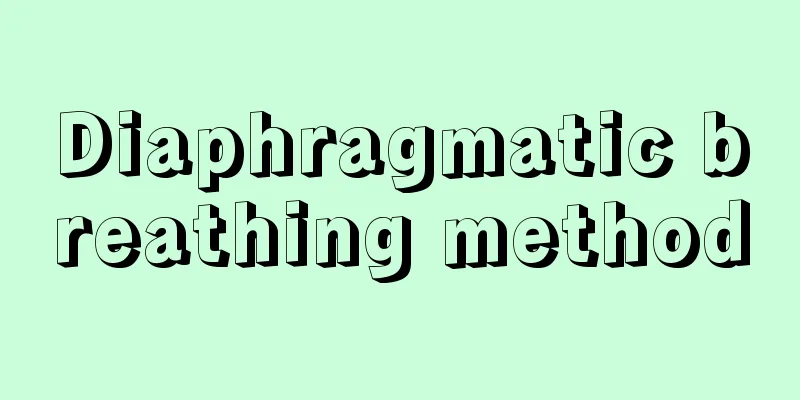Diaphragmatic breathing method

|
Diaphragmatic breathing, also known as abdominal breathing, is a breathing method that involves consciously controlling the movement of the diaphragm. Long-term diaphragmatic breathing can have certain health benefits for the heart and lungs. It can reduce lung infections, strengthen heart function, and enhance the power of the digestive system, among other benefits. However, most people have never heard of this breathing method, let alone how to do it. Let me introduce it to you in detail. Introduction to Breathing Techniques Abdominal breathing is mainly based on diaphragm movement, and the upper and lower diameters of the thorax increase during inhalation. Normal abdominal breathing takes about 10-15 seconds and can inhale about 500 ml of air. During abdominal breathing, the diaphragm will drop and the abdominal pressure will increase, and it will feel as if the air is entering the abdomen directly. At this time, if you put your hand on your belly button, you will feel your hand slightly lifted up and down. Practice Method Abdominal breathing Lie on your back or sit in a comfortable meditation position and relax your whole body. Observe your natural breathing for a while. Place your right hand on your belly, navel, and your left hand on your chest. As you inhale, expand your abdomen as much as possible, keeping your chest still. As you exhale, contract your abdomen inward as much as possible, keeping your chest still. Repeat this cycle, keeping the rhythm of each breath consistent. Carefully feel the rise and fall of your abdomen. After practicing for a period of time, you can take your hands away and just focus on the breathing process. Precautions edit Abdominal breathing First, breathe deeply and slowly. Second, breathe in through your nose and out through your mouth. Third, each breath should be within 15 seconds. That is, take a deep breath (puff up your belly) for 3-5 seconds, hold your breath for 1 second, then exhale slowly (retract your belly) for 3-5 seconds, and hold your breath for 1 second. Fourth, 5-15 minutes each time. 30 minutes is best. Fifth, for people in good health, the breath-holding time can be extended, and the breathing rhythm can be slowed down and deepened as much as possible. People with poor health do not have to hold their breath, but they must take a full breath. Practice 1-2 times a day, sitting, lying, walking or running, until you feel slightly warm and sweaty. Try to inflate and retract your abdomen 50-100 times. If saliva comes out of your mouth during breathing, swallow it slowly. |
<<: What is the green bitter water
>>: How to use the diaphragm when singing
Recommend
How can I detect colon cancer
Colorectal cancer is one of the most common malig...
Can winter melon and mushrooms be eaten together
When it comes to shiitake mushrooms, everyone is ...
What are the benefits of foot acupoint massage
When massaging the acupoints on the soles of the ...
Prostate cancer surgery affects quality of life
Surgery has always been considered the preferred ...
What are the symptoms of insufficient stomach yin?
Insufficient stomach yin is caused by eating too ...
How to detect skin allergens? It turns out there are two methods
Skin allergies are common conditions in daily lif...
What should be done before percutaneous interventional treatment of liver cancer? Be prepared
When patients with liver cancer undergo percutane...
Key points of the practical nursing guide for prostate cancer: Things to note for patients with prostate cancer
Nowadays, many men in society suffer from prostat...
In what areas is pcr testing applied
Molecular biology is considered cutting-edge tech...
The efficacy of Bupleurum chinense bark
I believe that everyone does not have a clear und...
Common complications of intravenous infusion
I believe that many people have experienced the u...
How to deal with nasal congestion caused by nasopharyngeal carcinoma
How to treat nasal congestion caused by nasophary...
TSH value control range after hemisection of thyroid cancer
Hemisection of thyroid cancer refers to a hemisec...
What are the causes of convulsions?
Convulsion is a common physical symptom in life. ...
Simple diet therapy suitable for recuperation of rectal cancer patients
After rectal cancer surgery, patients may also ex...









